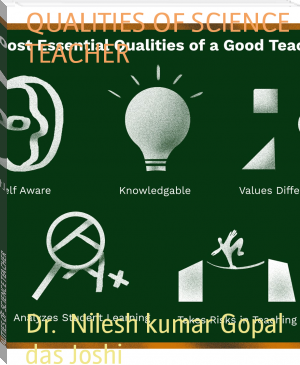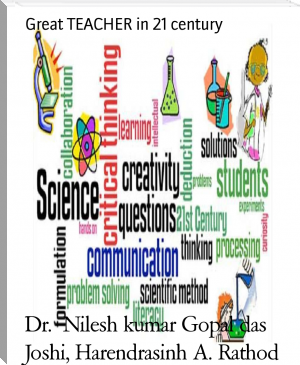MY SCHOOL, Dr .Nilesh Gopal das Joshi [best free ebook reader for pc txt] 📗

- Author: Dr .Nilesh Gopal das Joshi
Book online «MY SCHOOL, Dr .Nilesh Gopal das Joshi [best free ebook reader for pc txt] 📗». Author Dr .Nilesh Gopal das Joshi
.
Chapter: 30 FOOD AND NUTRITION
FOOD AND NUTRITION
MEANING OF FOOD AND NUTRITION
Food is a more basic need of man than shelter and clothing. Food is a most inevitable part of our existence. Human body cannot exist without food. After air and water, food is the utmost important thing for survival. Throughout human existence food has also been used, as an expression of love, friendship and social acceptance. Food is any substance consumed to provide nutritional support for the body. It is usually of plant or animal origin, and contains essential nutrients, such as carbohydrate, fat, proteins, vitamins or minerals. Food is a substance which after ingestion (intake of food), digestion (complex substance in food is broken down to simpler complexes) and absorption (nutrients move into the blood after digestion) is capable being utilized by the body for its various functions. Food is a mixture of substances that can be safely ingested. The constituents of food are necessary for:
Energy yielding by carbohydrates and fats Body building using proteins and minerals Protection Regulation of waste, roughage (dietary fiber) etc.Nutrition is a science that studies the relationship between diet and health.The diet of an organism is what it eats, which is largely determined by the availability and palatability of foods. For humans, a healthy diet includes preparation of food and storage methods that preserve nutrients from oxidation, heat or leaching, and that reduce risk of foodborne illness.
In humans, an unhealthy diet can cause deficiency-related diseases such as blindness, anemia, scurvy, preterm birth, stillbirth and cretinism, or nutrient excess health-threatening conditions such as obesity etc. i.e. nutrition is a science that interprets the interaction of nutrients and other substances in food in relation to maintenance, growth, reproduction, health and disease of an organism. It includes food intake, absorption, assimilation, biosynthesis, catabolism and excretion.
Nutrition also focuses on how disease conditions and problems can be prevented or lessened with a healthy diet. In addition nutrition involves identifying how certain diseases, conditions or problems may be caused by dietary factors, such as poor diet (under nutrition), food allergies, metabolic diseases, etc.
DEFINITION OF FOOD AND NUTRITION
“Food can be defined as anything solid or liquid which swallowed, digested and assimilated in the body keeps it well”
“food can be defined as any substance that people or aanimals eat or drink or that plants absorb inorder to maintain life and growth”
“Science and human medicine defines nutrition as the science or practice of consuming and utilizing foods”
NEED FOR FOOD AND NUTRITION
Need and Importance of Nutrition:
Body depends on food for its growth, maintenance and health. Food acts as its fuel and provides energy. It makes use of the consumed energy, keeps the body temperature and invigorates the mind and nervous system. Both the quantity and quality of the food are important for the body.
As the old tissues are broken, consumed or spent in work through the process of katabolism, food replaces the same through the process of anabolism. Combination of these two processes goes on continuously in the human body and the combined process is known as metabolism.
The quantity of food needed daily by a child or adult varies according to the nature of occupation, general health and the rate of metabolism. Both over-eating and under-eating are harmful. Therefore, there is need for knowing the exact amount of nutrition needed by a person or his balanced diet. Lack of proper nutrition or balanced diet is called malnutrition. In India, malnutrition is a common problem with most of the children and adults.
Food is essential for our bodies to:
develop, replace and repair cells and tissues produce energy to keep warm, move and work carryout chemical processes such as digestion of food protect against, resist and fight infection ad recover from sicknessNutrition is essential for our bodies to:
improve immunity decreased susceptibility to diseases better physical and mental development improved productivityNUTRITIONAL BALANCE
Being in a nutritional balance means that you consume just the right amount of calories, macronutrients and micronutrients from your diet. In an optimal nutritional state, all of your nutritional needs are met without exceeding your caloric needs. Maintaining a stable healthy weights, having low blood cholesterol and healthy blood pressure levels are just a few signs of being nutritionally balanced. If you notice sudden gain or lack of energy, it may be time for you to adjust your diet.
Some of the calories you consume support your basal metabolic rate or BMR. These calories are recovered for basic body functions, such as breathing, digestion and central nervous system function. When you diet is nutritionally balanced you have enough calories to support you BMR and enough left over to meet your daily activities. Approximately 60 to 70 percent of the total calories you consume go toward your BMR, says the National Institute Of health office of science education. If you normally consume around 1800 calories per day, more than 1000 of these calories are needed just to keep your body running.
Nutritional balance is the consumption of right amount of calories, micronutrients and macronutrients. In an optimal nutritional state, nutritional needs are met without exceeding caloric needs. Maintaining a stable healthy weight, having low blood cholesterol and healthy blood pressure levels are few signs of being nutritionally balanced.
BALANCED DIET
“Balanced diet may be defined as the diet consisting of a variety of different types of food and providing adequate amounts of the nutrients necessary for good health”
A balanced diet is one which provides all the nutrients in required amounts and proper proportions. The quantities of foods needed to meet the nutrient requirements vary with age, gender it is important to have age, gender, physical activities and physiological status. A balanced diet should provide around 60-70%of total calories from carbo hydrates, preferebly starch, about 10-12% from protein and 20-25% from fat.
Balanced diet can easily be achieved through a blend of 5 basic food groups. the five basic food groups are:
cereal grains and products pulses and legumes milk, meet,egg,and their products. fruits and vegetables fats and sugarsA healthy, balanced diet is important for brain development and function. while getting the right nutrients is important for your brain at any age, it is critical for infants and children who are still forming their brain and nervous system. the website NHS choices notes that it has not yet been determined if diet affectes intelligence, but memory and brain functions are affected by diet. a daily diet can contain xcess of unhealthy fats, and sugars can impair brain development and functions.
Characteristics of a balanced diet
The food articles containing proteins and minerals are contained in the diet in adequate amount. The materials providing energy are present in the diet in adequate amount Presence of preventive nutrition is necessary for a balanced diet This varies with age of each individual This varies according to sex of each individual This varies according to the climate of the place This varies according the occupation of each individualPrinciples of Diet Planning
Diet planning implies the use of right foods, at the right time, in the right manner and in right quantity. It is true that in a family there are individual differences regarding food habits. Yet there are broad principles which must be observed in planning. These are:
Principle of nourishment. Principle of selection of food item from broad categories. Principle of age, i.e., diet for an infant will be different from that of a child. Principles of sex which implies that




Comments (0)